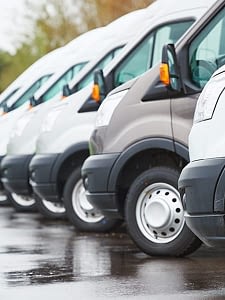 A commercial auto insurance policy is required under most circumstances when the vehicle is used for business purposes and meets certain other requirements. It is not just the registration that determines the requirement for a business automobile insurance policy. Other requirements are ownership by a corporation, use in hauling goods for hire and gross vehicle weight of the vehicle. Some small trucks can be owned and insured under a personal automobile insurance policy under specific circumstances.
A commercial auto insurance policy is required under most circumstances when the vehicle is used for business purposes and meets certain other requirements. It is not just the registration that determines the requirement for a business automobile insurance policy. Other requirements are ownership by a corporation, use in hauling goods for hire and gross vehicle weight of the vehicle. Some small trucks can be owned and insured under a personal automobile insurance policy under specific circumstances.
Commercial automobile insurance policies are not regulated in pricing, as are private passenger policies. There is price competition between insurance companies for good commercial automobile insurance.
Commercial Auto Insurance
Commercial auto insurance helps cover the costs of an auto accident if you or an employee is at fault. This coverage can help pay for damaged property and medical expenses – even in the event of a fatal accident.
What Is Commercial Auto Insurance?
Commercial auto insurance can help protect business owners and their companies if, for example:
- An employee hits a pedestrian while driving one of the business vehicles. The pedestrian requires medical treatment that results in large medical bills.
- You swerve off the road while driving to work in a company vehicle and take out a residential mailbox.
- An employee driving to work in a company vehicle hits another car and totals it .
Who Needs Commercial Auto Insurance?
Consider commercial auto insurance if your business:
- Owns, leases, or rents vehicles such as cars and trucks.
- Has employees who drive their own vehicles to conduct business.
- Has employees who operate leased, rented, or owned company vehicles.
What Vehicles Are Covered Under Commercial Auto Insurance?
If you’re driving a vehicle for business reasons, having the right commercial vehicle insurance is important. So whether you’re using a four-door sedan to travel to and from business meetings or you’re towing a few tons of cargo in a large delivery truck, the right coverage can help protect your business.
A good rule of thumb is to consider if the vehicle is being operated in relation to the job. If it is, you’ll likely need business auto insurance coverage. Remember that using a vehicle to commute to and from work doesn’t constitute a need for commercial vehicle insurance.
What Is Hired and Non-Owned Auto Coverage?
Many business owners use vehicles that they don’t own for work purposes. Whether you’re renting or leasing a car for business purposes, you’ll face risks on the road. That’s where hired and non-owned auto insurance (HNOA) can help.
What Is Covered by Hired and Non-Owned Auto Insurance?
Hired and non-owned auto insurance helps cover:
- Physical damage to another person’s car
- Medical expenses if someone else gets hurt in an accident
- Legal expenses if your business gets sued for negligence
Be aware that hired and non-owned auto insurance is a type of liability insurance but it doesn’t provide coverage for the policyholder. This means it won’t help with:
- Property damage to your business’ hired or non-owned vehicle.
- Medical bills if you or your employee get hurt in an accident while using a rented or personally-owned vehicle.
- Liability coverage, or damages or bodily injury from an accident, while you or your employee drive for personal reasons that are unrelated to your business.
Common Questions about Hired & Non-Owned Auto
What Is the Difference Between Commercial Auto and Hired and Non-Owned Auto?
Commercial auto insurance helps protect the company vehicles your business owns. This is different from hired and non-owned auto coverage meant to protect rented or borrowed vehicles.
How Can I Get Hired and Non-Owned Auto Coverage?
Just request a quote to find out coverage and premium options. We can also be reached by contacting us today.